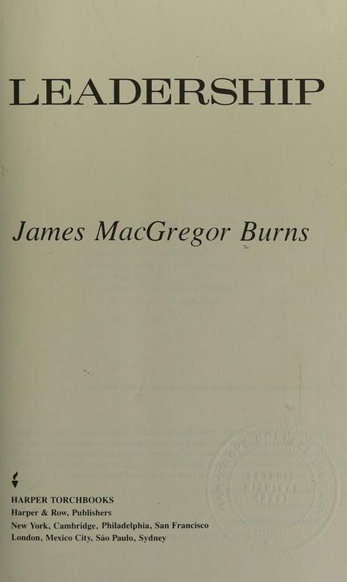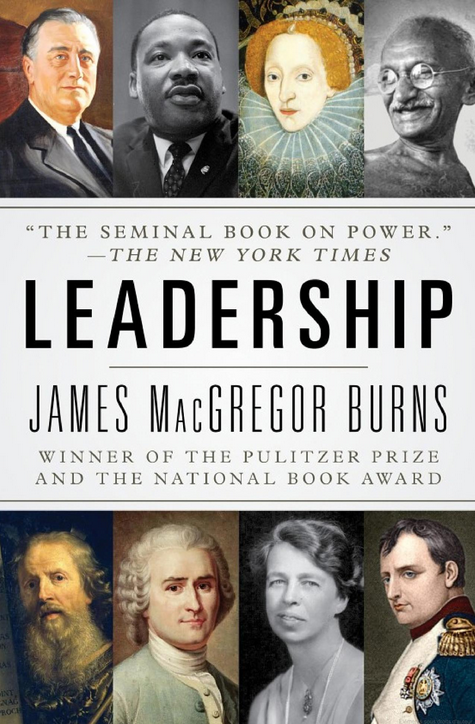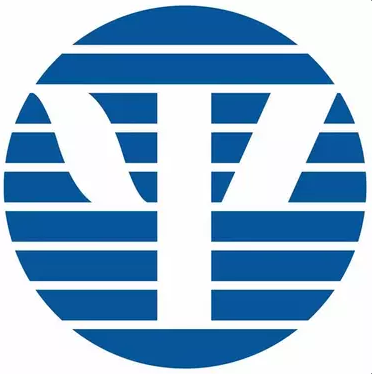Notion
1978
Etude historique et biographique sur les grands leaders politiques et formalisation de la notion « transformational leadership ».
Article
2001
Proposition de méthode de management s'inspirant de la notion de base pour l'adapter au management dans l'U.S. Air Force.
Plagiat
2012
Détournement frauduleux de l'article de 2001 lors d'un congrès du Project Management Institute (PMI) ; le plagiat est révélé et attesté en 2018.
 Origines de la notion
Origines de la notion
D'après l'article original et son plagiat présentés plus bas, la notion de « transformational leadership » dont les auteurs respectifs des deux publications s'inspirent aurait été définie en particulier dans le livre suivant :
Burns JM. Leadership.
New York, Hagerstown, San Francisco, London: Harper & Row; 1978. (Harper torchbooks).


Rééditions
Par exemple ici chez Open Road Media (2012). Extraits disponibles sur Google Books
Résumé Google Books
A Pulitzer Prize–winning historian examines transformational leaders from Moses to Machiavelli to Martin Luther King Jr. in this “impressive book” (The Washington Post). Historian and political scientist James MacGregor Burns has spent much of his career documenting the use and misuse of power by leaders throughout history. In this groundbreaking study, Burns examines the qualities that make certain leaders—in America and elsewhere—succeed as transformative figures. Through insightful anecdotes and historical analysis, Burns scrutinizes the charisma, vision, and persuasive power of individuals able to imbue followers with a common sense of purpose, from the founding fathers to FDR, Gandhi to Napoleon. Since its original publication in 1970, Leadership has set the standard for scholarship in the field."
Sélection de résumés critiques :

Review of Leadership.
Berman L. Review of Leadership. Political Science Quarterly. 1979; 94(2): 346‑8. [Aperçu consulté 11 nov 2023] Disponible sur: https://www.jstor.org/stable/2149858

Leadership.
Résumé critique sur la base APA Psycnet [consulté le 11 nov 2023] Disponible sur: https://psycnet.apa.org/record/1980-03173-000
 Proposition d'application dans l'US Air Force
Proposition d'application dans l'US Air Force
Transformational Leadership by Colonel Mark A. Homrig
"Clearly the leader who commands compelling causes has an extraordinary potential influence over followers. James MacGregor Burns
The current research in leadership is overflowing with articles and books describing the virtues of “transformational” leadership. Recent authors include Noel Tichy, The Leadership Engine (1997), John Kotter, On What Leaders Really Do (1999), and articles written in the Journal of Leadership Studies by Dong Jung, Walter Einstein and John Humphreys (2001) to name a few. James MacGregor Burns coined this term in 1978 to describe the ideal situation between leaders and followers. James Keagen used Burns’ ideas to build a developmental model of leadership that explains further the continuum between transformational and transactional leadership. What radical new form or fad of leadership is this? What is the difference between transformational leadership and transactional leadership and which is the most effective? How does a leader get everyone performing to their potential? Are there any pitfalls with transformational leadership? What is the relationship between leadership and management? What are the attributes of the transformational leader? Finally, what conclusions can be drawn about the usefulness of transformational leadership?
After reading Burns, Kotter, Tichy, Jung, Einstein, Humphreys, and the biographies of military leaders from throughout the ages, the conclusion seems quite clear. Leadership principles are timeless, while, the models that examine those principles may change. The transformational model offers one of many good ways to examine leadership and the type of leader, and follower, who are ideally suited for today’s and tomorrow’s strategic environment. This is especially so for the profession of arms and in particular the Air Force. While all the services and government agencies espouse leadership principles, this paper more closely examines the Air Force. No doubt the similarities and differences between the services and government agencies are very interesting. [...]"
Homrig MA. Transformational Leadership. 2001 [cité 1 août 2023]; Disponible sur: https://www.gocivilairpatrol.com/media/cms/Transformational_Leadership_B14231894F031.pdf
 Détournement frauduleux
Détournement frauduleux
Transformational Leadership for Project Managers: how to Lead, not just Manage Projects, Conference paper (Skill developement) by Thomas Mattus
"The current research in leadership is overflowing with articles and books describing the virtues of "transformational" leadership. Famous leadership experts, such as Noel Tichy, The Leadership Engine (1997), and John Kotter, On What Leaders Really Do (1999) cite and use the term that James MacGregor Burns coined in 1978 to describe the ideal situation between leaders and followers. James Keagen later used Burns' ideas to build a developmental model of leadership that explains further the continuum between transformational and transactional leadership. This paper discusses transformation leadership for project managers and explores these questions. What radical new form or fad of leadership is this? What is the difference between transformational leadership and transactional leadership and which is the most effective? How does a project manager get everyone performing to his or her potential? Are there any pitfalls with transformational leadership being used with project teams? What is the relationship between project leadership and day to day management? What are the attributes of the transformational leader? Finally, what conclusions can be drawn about the usefulness of transformational leadership in the world of project management?
The paper begins by defining transactional style and transformational style. It examines the six-stage style of developmental theory, specifically focuses on stages 2, 3, and 4. The paper lists four interrelated components that are essential for leaders to move followers into the transformational style. In addition, it covers some of the attributes of the transformational leadership style and lists 10 tenets of transformational leadership. [...] "
Mattus T. Transformational Leadership for Project Managers: how to Lead, not just Manage Projects [Internet]. Way Back Machine. 2012 [cité 1 août 2023]. Disponible sur: https://web.archive.org/web/20170215194358/https://www.pmi.org/learning/library/transformational-leadership-project-managers-lead-6030

Plagiat détecté et attesté en 2018
Extrait de l'article publié sur le site Retraction Watch le 2 janvier 2018 :
"A business consultant allegedly plagiarized an article on leadership written by a former U.S. Air Force officer who is now a high-ranking official in the Department of Homeland Security. Thomas Mattus, president and founder of a business training firm, submitted a paper to the Project Management Institute (PMI) Global Congress in Vancouver, Canada. The paper, on “transformational leadership,” defined the term and its relevance to the world of project management. PMI accepted “Transformational leadership for project managers” as a conference paper and posted it in 2012 to the PMI website. But a researcher at the U.S. Naval War College alleges that Mattus plagiarized the paper from an article written in 2001 by Mark Homrig, who was a colonel in the Air Force at the time. Homrig is now a section chief at Homeland Security. The researcher, Brenda Oppermann, told us: "The only difference is that Mattus’ paper replaces “Air Force” with “project organizations,” “project teams,” and the like throughout the paper. There is also no citation referencing Homrig’s paper/the original work despite the fact that it is essentially the same paper word for word and Homrig’s was written 11 years earlier." [...] "
Han AP. Consultant allegedly plagiarized US Air Force officer [Internet]. Retraction Watch. 2018a [cité 29 juin 2022]. Disponible sur: https://retractionwatch.com/2018/01/02/consultant-allegedly-plagiarized-us-air-force-officer/
Extrait de l'article publié sur le site Retraction Watch le 4 janvier 2018 :
"A consultant has admitted to plagiarizing a U.S. Air Force officer in a paper on leadership, and says his company is now in jeopardy of losing top clients, including Fortune 100 companies. On Tuesday, we reported allegations that Thomas Mattus, president of the project management consulting firm Successful Strategies International (SSI), plagiarized in a 2012 paper he wrote for a conference run by the Project Management Institute (PMI). The article he plagiarized, on the topic of “transformational leadership,” was written in 2001 by Col. Mark Homrig, now a section chief at the U.S. Department of Homeland Security. Mattus, who had not previously replied to our request for comment, has now admitted to copying Homrig’s article. He told us: "I had to get in front of a couple hundred people and give a powerpoint presentation. I researched a topic and I had to do this white paper. Being sloppy, I just copied and pasted [Homrig’s] article. You can copy and paste it but you should give someone credit". [...]"
Han AP. Consultant admits to plagiarizing Air Force colonel’s paper on leadership [Internet]. Retraction Watch. 2018b [cité 1 août 2023]. Disponible sur: https://retractionwatch.com/2018/01/04/consultant-admits-plagiarizing-air-force-colonels-paper-leadership/
Voir aussi
Leadership [Définitions] ; Transformation [Définitions]
Dernière mise à jour le 11-11-2023
